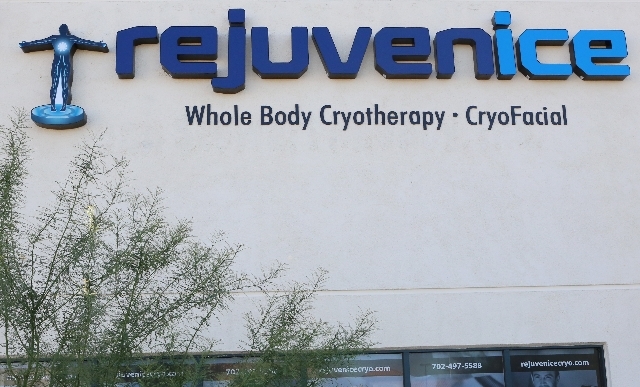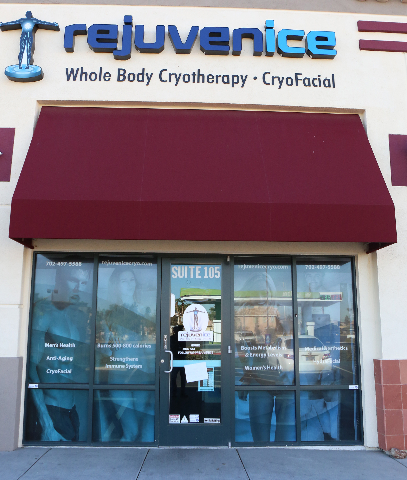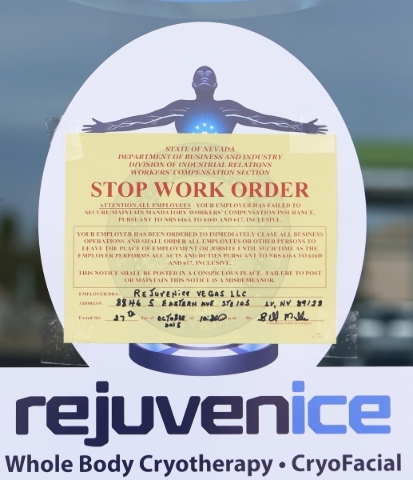Cryotherapy spa reopens; new guidelines revealed
A Rejuvenice spa reopened Friday after being closed by state officials last month following the death of an employee in a cryotherapy unit at another of the company's locations.
The Rejuvenice at 8751 W Charleston Blvd. in Las Vegas could have reopened sooner. A stop-work order was lifted last month.
Two other locations, including the one at 8846 S. Eastern Ave. where Chelsea Patricia Ake-Salvacion died in October, remain closed.
The spa on Charleston reopened the same day the state Division of Public and Behavioral Health released guidelines on how cryotherapy should be delivered.
Among the recommendations are that no one under age 18 be allowed to use cryotherapy and that only trained workers should operate the machines.
Rejuvenice officials released a statement Friday saying they have updated employee protocols and policies to ensure the safety of clients who will be supervised by a trained professional for the duration of their treatment.
In cryotherapy, people stand in chambers where they are exposed to temperatures as cold as minus 300 degrees for short periods.
Users say the regimen enhances recovery after exercise, helps rehabilitation after injury and offers a detoxification effect.
No medical research has been done in the U.S. to show whether the process is more effective than local ice-pack application or cold-water immersion or whether cryotherapy aids functional recovery.
State health officials visited cryotherapy providers and consulted with CryoUSA in Dallas, a distributor of the machines in the United States.
“You should always consult with a licensed medical provider before engaging in any procedure that may affect your health,” Nevada's Chief Medical Officer Dr. Tracey Green said in a statement.
After Ake-Salvacion, 24, of Las Vegas was found dead Oct. 20 at the Rejuvenice Spa where she worked, state business and health officials began reviewing public health and safety concerns of cryotherapy. Ake-Salvacion died in one of the machines after using the unit alone after she closed the night before.
The guidelines set standards for Nevada and provide information to consumers so they can decide about using cryotherapy machines. Guidelines are not considered law, but they should guide practice, the health agency said.
"The machine should never be operated by a person on themselves," the guidelines say. "It should have a well-trained employee operating the machine for the client."
The guidelines also say clients' heads must be above the level of fog produced in the machine, and should not be in the units for more than three minutes. Blood pressure readings should be taken on clients before and after their sessions.
Users should be screened for current or past medical conditions such as heart attack or stroke, high blood pressure, pregnancy, seizure disorder, Reynaud’s syndrome, cold allergies, blood clotting issues, an infection or fever, a pacemaker and other implanted medical devices, claustrophobia, or any other serious medical condition.
Facilities should post signs saying cryotherapy is not a medical procedure and cannot be used to treat illness or a medical condition.
Spa operators should offer their staffs hazard-communication training and instructions on how to handle nitrogen tanks.
Facilities should have a defibrillator and emergency kit onsite, and train employees to use them and how to perform CPR. A nitrogen monitor also should be installed to monitor the air in the rooms to ensure levels are within a safe range.
Ake-Salvacion had expressed concerns about liquid nitrogen leaking from and being overdelivered by the machines at Rejuvenice, according to attorney Richard Harris of Las Vegas. He heads one of the law firms the family has retained to investigate what went wrong the night Ake-Salvacion died.
Cryotherapy users are engulfed with air cooled by liquid nitrogen. Users have their heads exposed, and a fog from the nitrogen-cooled air pours out of the unit.
Breathing too much nitrogen can deplete the oxygen supply in the blood, which can be fatal if the situation is not reversed.
The Clark County coroner's officials ruled this month that Ake-Salvacion died from accidental asphyxia from being in an oxygen-poor environment. After Las Vegas police homicide detectives reviewed evidence gathered in the initial investigation, police announced this month that Ake-Salvacion's death was not a criminal incident.
Contact Steven Moore at smoore@reviewjournal.com or 702-380-4563. Follow him on Twitter at @steve_smoore_rj



















